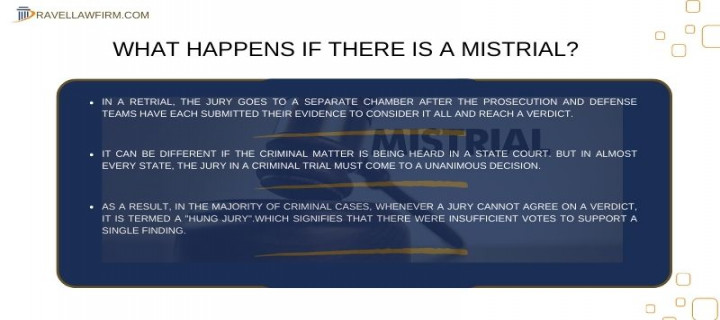Is a Defendant Released After a Mistrial?
Introduction
Mistrials are a common occurrence in the legal system, and they happen for various reasons. A mistrial is simply a trial that is terminated before it reaches its conclusion, usually because of some irregularity or misconduct. When a mistrial occurs, the question on everyone’s mind is, what happens to the defendant? Will they be released from custody or will they have to face another trial? In this article, we will explore the topic of whether a defendant is released after a mistrial.
What is a Mistrial?
A mistrial is a legal term that refers to a trial being terminated before it reaches its conclusion. The reasons for a mistrial can vary, but they usually involve some form of improper conduct or irregularity in the trial. Some common reasons for a mistrial include:
Jury Misconduct

If the jury in a trial engages in misconduct, such as discussing the case with someone who is not part of the trial or doing independent research on the case, a mistrial may be declared.
Prejudicial Evidence
If prejudicial evidence is introduced in a trial, it may cause the trial to be declared a mistrial. Prejudicial evidence is evidence that is likely to create unfair bias against the defendant.
Judicial Misconduct
If the judge in a trial engages in misconduct, such as showing bias towards one side or making improper rulings, a mistrial may be declared.
Deadlocked Jury
If the jury in a trial is unable to reach a verdict after an extended period of deliberation, the trial may be declared a mistrial.
Is a Defendant Released After a Mistrial?
The answer to this question is not straightforward. It depends on the circumstances surrounding the mistrial. If the mistrial was caused by prosecutorial misconduct or judicial error, the defendant may be released. In such cases, the defendant cannot be retried due to the double jeopardy rule. However, if the mistrial was caused by something within the defendant’s control, such as their own misconduct or a request for a mistrial, the defendant can be retried.
Double Jeopardy Rule
The double jeopardy rule is a legal principle that states that a person cannot be tried for the same offense twice. This means that if a defendant is acquitted (found not guilty) of a crime, they cannot be retried for the same crime. The double jeopardy rule also applies in cases where a mistrial is declared due to prosecutorial misconduct or judicial error. In such cases, the defendant is considered to have been acquitted, even though the trial did not reach its conclusion.
Can a Defendant be Retried After a Mistrial?
If the mistrial was caused by something within the defendant’s control, such as their own misconduct or a request for a mistrial, the defendant can be retried. In such cases, the defendant is not protected by the double jeopardy rule and can be retried for the same offense. However, if the mistrial was caused by prosecutorial misconduct or judicial error, the defendant cannot be retried due to the double jeopardy rule.
What Happens to a Defendant During a Mistrial?
During a mistrial, the defendant remains in custody unless they are released on bail. If the mistrial was caused by something within the defendant’s control, such as their own misconduct or a request for a mistrial, the defendant may not be released on bail. However, if the mistrial was caused by prosecutorial misconduct or judicial error, the defendant may be released on bail.
What Happens to the Jury During a Mistrial?
During a mistrial, the jury is discharged from their duty and sent home. They are not required to deliberate further or to return a verdict. If the defendant is retried, a new jury will be selected.
FAQs
Can a defendant be retried after a mistrial?
Yes, a defendant can be retried after a mistrial, but it depends on the circumstances surrounding the mistrial. If the mistrial was caused by something within the defendant’s control, such as their own misconduct or a request for a mistrial, the defendant can be retried. If the mistrial was caused by prosecutorial misconduct or judicial error, the defendant cannot be retried due to the double jeopardy rule.
What happens to the defendant during a mistrial?
During a mistrial, the defendant remains in custody unless they are released on bail. If the mistrial was caused by something within the defendant’s control, such as their own misconduct or a request for a mistrial, the defendant may not be released on bail. However, if the mistrial was caused by prosecutorial misconduct or judicial error, the defendant may be released on bail.
What is the double jeopardy rule?
The double jeopardy rule is a legal principle that states that a person cannot be tried for the same offense twice. This means that if a defendant is acquitted (found not guilty) of a crime, they cannot be retried for the same crime. The double jeopardy rule also applies in cases where a mistrial is declared due to prosecutorial misconduct or judicial error.
What is prejudicial evidence?
Prejudicial evidence is evidence that is likely to create unfair bias against the defendant. If prejudicial evidence is introduced in a trial, it may cause the trial to be declared a mistrial.
What happens to the jury during a mistrial?
During a mistrial, the jury is discharged from their duty and sent home. They are not required to deliberate further or to return a verdict. If the defendant is retried, a new jury will be selected.
What is a mistrial?
A mistrial is a legal term that refers to a trial being terminated before it reaches its conclusion. The reasons for a mistrial can vary, but they usually involve some form of improper conduct or irregularity in the trial.
What is jury misconduct?
Jury misconduct refers to any improper conduct on the part of the jurors in a trial. Examples of jury misconduct include discussing the case with someone who is not part of the trial or doing independent research on the case.
Conclusion
In conclusion, whether a defendant is released after a mistrial depends on the circumstances surrounding the mistrial. If the mistrial was caused by something within the defendant’s control, such as their own misconduct or a request for a mistrial, the defendant can be retried. If the mistrial was caused by prosecutorial misconduct or judicial error, the defendant cannot be retried due to the double jeopardy rule. It is essential to understand the implications of a mistrial and how it can affect the outcome of a trial.
